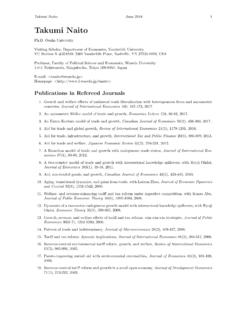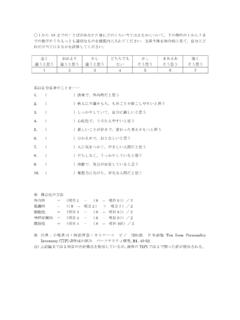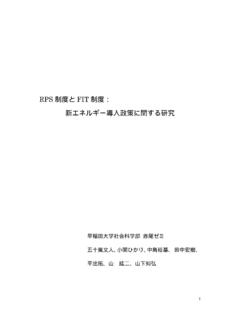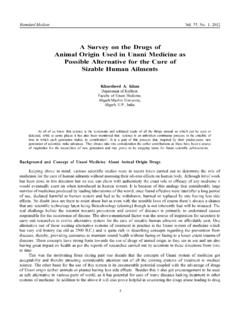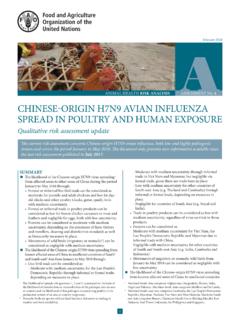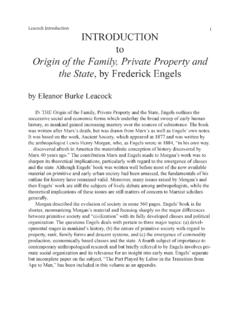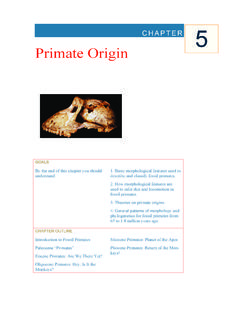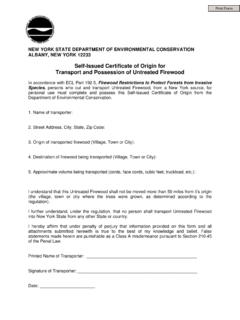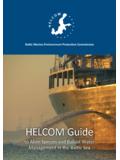Transcription of On the Origin of Species - Waseda University
1 On the Origin of Species by Charles Darwin A PENN STATE ELECTRONIC CLASSICS SERIES PUBLICATION. On the Origin of Species by Charles Darwin is a publication of the Pennsylvania State University . This Portable Document file is furnished free and without any charge of any kind. Any person using this document file, for any purpose, and in any way does so at his or her own risk. Neither the Pennsylvania State University nor Jim Manis, Faculty Editor, nor anyone associated with the Pennsylvania State University assumes any re- sponsibility for the material contained within the document or for the file as an elec- tronic transmission, in any way. On the Origin of Species by Charles Darwin, the Pennsylvania State University , Electronic Classics Series, Jim Manis, Faculty Editor, Hazleton, PA 18202-1291 is a Portable Docu- ment File produced as part of an ongoing student publication project to bring classical works of literature, in English, to free and easy access of those wishing to make use of them.
2 Cover Design: Jim Manis Copyright 2001 The Pennsylvania State University The Pennsylvania State University is an equal opportunity University . Charles Darwin On the Origin too well studied in the book of God's word, or in the book of God's works; divinity or philosophy; but rather let men endeavour an endless progress or of Species proficience in both.'. Bacon: Advancement of Learning. by Down, Bromley, Kent, Charles Darwin October 1st, 1859. On the Origin of Species by Means of Natural Selec- But with regard to the material world, we can at tion, or the Preservation of Favoured Races in the least go so far as this we can perceive that events Struggle for Life.
3 Are brought about not by insulated interpositions of Divine power, exerted in each particular case, but By by the establishment of general laws.'. Charles Darwin W. Whewell: Bridgewater Treatise. To conclude, therefore, let no man out of a weak conceit of sobriety, or an ill-applied moderation, think or maintain, that a man can search too far or be 3. On the Origin of Species Contents Chapter II. Introduction Variation under Nature Chapter I Variability Individual Differences Doubtful Species Wide ranging, much diffused, and com- Variation under Domestication mon Species vary most Species of the larger gen- era in any country vary more than the Species of the Causes of Variability Effects of Habit Correla- smaller genera Many of the Species of the larger tion of Growth Inheritance Character of Domes- genera resemble varieties in being very closely, but tic Varieties Difficulty of distinguishing between unequally, related to each other, and in having re- Varieties and Species Origin of Domestic Variet- stricted ranges.
4 Ies from one or more Species Domestic Pigeons, their Differences and Origin Principle of Selec- Chapter III. tion anciently followed, its Effects Methodical and Unconscious Selection Unknown Origin of our Struggle for Existence Domestic Productions Circumstances favourable to Man's power of Selection. Bears on natural selection The term used in a wide sense Geometrical powers of increase Rapid increase of naturalised animals and plants Nature of the checks to increase Competition universal 4. Charles Darwin Effects of climate Protection from the number acter, related to the diversity of inhabitants of any of individuals Complex relations of all animals small area, and to naturalisation Action of Natu- and plants throughout nature Struggle for life ral Selection, through Divergence of Character and most severe between individuals and varieties of the Extinction, on the descendants from a common par- same Species ; often severe between Species of the ent Explains the Grouping of all organic beings.
5 Same genus The relation of organism to organism the most important of all relations. Chapter V. Chapter IV Laws of Variation Natural Selection Effects of external conditions Use and disuse, com- bined with natural selection; organs of flight and of Natural Selection its power compared with man's vision Acclimatisation Correlation of growth selection its power on characters of trifling im- Compensation and economy of growth False portance its power at all ages and on both sexes correlations Multiple, rudimentary, and lowly Sexual Selection On the generality of inter- organised structures variable Parts developed in crosses between individuals of the same Species an unusual manner are highly variable: specific char- Circumstances favourable and unfavourable to Natu- acters more variable than generic.
6 Secondary sexual ral Selection, namely, intercrossing, isolation, num- characters variable Species of the same genus vary ber of individuals Slow action Extinction in an analogous manner Reversions to long-lost caused by Natural Selection Divergence of Char- characters Summary. 5. On the Origin of Species Chapter VI Chapter VII. Difficulties on Theory Instinct Difficulties on the theory of descent with modifica- Instincts comparable with habits, but different in their tion Transitions Absence or rarity of transitional Origin Instincts graduated Aphides and ants . varieties Transitions in habits of life Diversi- Instincts variable Domestic instincts, their Origin fied habits in the same Species Species with hab- Natural instincts of the cuckoo, ostrich, and para- its widely different from those of their allies Or- sitic bees Slave-making ants Hive-bee, its cell- gans of extreme perfection Means of transition making instinct Difficulties on the theory of the Cases of difficulty Natura non facit saltum Or- Natural Selection of instincts Neuter or sterile in- gans of small importance Organs not in all cases sects Summary.
7 Absolutely perfect The law of Unity of Type and of the Conditions of Existence embraced by the Chapter VIII. theory of Natural Selection. Hybridism Distinction between the sterility of first crosses and of hybrids Sterility various in degree, not univer- sal, affected by close interbreeding, removed by do- mestication Laws governing the sterility of hy- 6. Charles Darwin brids Sterility not a special endowment, but inci- sudden appearance of groups of Species On their dental on other differences Causes of the sterility sudden appearance in the lowest known fossilifer- of first crosses and of hybrids Parallelism between ous strata. the effects of changed conditions of life and crossing Fertility of varieties when crossed and of their Chapter X.
8 Mongrel offspring not universal Hybrids and mongrels compared independently of their fertility On the Geological Succession of Organic Beings Summary. On the slow and successive appearance of new spe- Chapter IX cies On their different rates of change Species once lost do not reappear Groups of Species fol- On the Imperfection of the Geological Record low the same general rules in their appearance and disappearance as do single Species On Extinction On the absence of intermediate varieties at the On simultaneous changes in the forms of life present day On the nature of extinct intermediate throughout the world On the affinities of extinct varieties; on their number On the vast lapse of Species to each other and to living Species On the time, as inferred from the rate of deposition and of state of development of ancient forms On the suc- denudation On the poorness of our cession of the same types within the same areas.
9 Palaeontological collections On the intermittence Summary of preceding and present chapters. of geological formations On the absence of inter- mediate varieties in any one formation On the 7. On the Origin of Species Chapter XI source with subsequent modification Summary of the last and present chapters. Geographical Distribution Chapter XIII. Present distribution cannot be accounted for by dif- ferences in physical conditions Importance of bar- Mutual Affinities of Organic Beings: riers Affinity of the productions of the same con- Morphology: Embryology: Rudimentary Organs tinent Centres of creation Means of dispersal, by changes of climate and of the level of the land, Classification, groups subordinate to groups.
10 And by occasional means Dispersal during the Natural system Rules and difficulties in classifi- Glacial period co-extensive with the world. cation, explained on the theory of descent with modi- fication Classification of varieties Descent al- Chapter XII ways used in classification Analogical or adap- tive characters Affinities, general, complex and Geographical Distribution continued radiating Extinction separates and defines groups Morphology, between members of the same class, Distribution of fresh-water productions On the between parts of the same individual Embryol- inhabitants of oceanic islands Absence of Batra- ogy, laws of, explained by variations not superven- chians and of terrestrial Mammals On the rela- ing at an early age.
